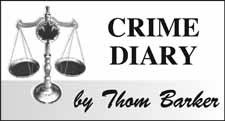Just when you're struggling to find a column topic, up pops poor old Mike Duffy again.
This time, the sordid PMO-Senate scandal has resulted in 31 criminal charges, three of which-bribery, frauds on the government and breach of trust-are related to the infamous $90,000 cheque former PMO chief of staff Nigel Wright cut to Duffy allegedly as hush money.
That so much attention has been and is being focused on the $90,000 is good because it underscores the ethical bankruptcy at the core of the Conservative Party reaching all the way to the office of the Prime Minister.
However, perhaps too much attention is being paid to the issue that while Duffy faces a charge of bribery for accepting the cheque, Wright is not facing the same charge for giving it.
The RCMP announced in April it would not be pursuing criminal charges against Wright because there was not enough evidence. A lot of people, particularly journalists, have been scratching their heads over this, even speculating whether Wright cut a deal with prosecutors to testify against Duffy.
Wright has denied this through his lawyer. What is much more likely is that even if police were able to determine a criminal act had been committed (mens actus), they may not have been able to make a case for intent, (mens rea). Both are required in Canada to prove criminal liability.
It may well be the bribery charge against Duffy will also prove untenable. Much has been made, after all, about the suspended senator's sense of "entitlement to his entitlements."
It does raise other very important questions, though, which NDP MP Charlie Angus, the Official Opposition's ethics critic, has been trying to bring to the forefront for months. The first question is why are Wright and Duffy not being charged under the Parliament of Canada Act (PCA)?
Prosecutions under the PCA are not subject to the same burden of proving intent and the applicable section on Conflict of Interest is unambiguous with respect to what constitutes illegal compensation.
The second question is why was the Public Prosecution Service (PPSC) not consulted?
According to the service's website: "The PPSC reports to Parliament through the Attorney General of Canada. The Director of Public Prosecutions Act states that the Director of Public Prosecutions acts "under and on behalf of the Attorney General of Canada." The relationship between the Attorney General and the Director is premised on the principles of respect for the independence of the prosecution function and the need to consult on important matters of general interest."
Of course the attorney general, Peter McKay, is part of Harper's inner circle and we have seen far too often the disdain with which the Harper government treats Canada's independent democratic institutions. At the very least, the optics are not very good.
We can only hope that Duffy does ultimately go to trial and the proceedings shed some light on these issues.
What all the focus on the $90,000 has obscured, to a certain extent at least, is the alleged illegality of claiming those expenses in the first place, fraudulent claims for travel expenses unrelated to Senate business and fraudulent awarding of consulting contracts. The latter two, in fact, make up the bulk of the charges against Duffy.
With respect to the one count each of fraud and breach of trust for the living expenses, Duffy may well rely on an intent defence as well. He has maintained to this day that he believed he was entitled to those expenses because he was told he was.
When Ottawa Citizen reporter Glen McGregor broke the story in 2012, he quoted Senator David Tkachuk, then chair of the Senate Committee on Internal Economy, as saying, "Your primary residence is what you say your primary residence is."
Duffy will be harder pressed to defend himself on the four counts each of fraud and breach of trust related to the awarding of consulting contracts and the four counts of fraud and nine counts of breach of trust related to expenses unrelated to Senate business.
On the latter, no reasonable person could possibly not know that it was wrong to claim expenses from one employer while working for another. That's just common sense.
On the consulting contracts, these are probably the dodgiest circumstances of all. When RCMP investigator Cpl. Greg Horton was looking into the senator's housing and travel claims, he came across nearly $65,000 in payments to two companies, Maple Ridge Media and Ottawa ICF. Maple Ridge was started, and later renamed Ottawa ICF, by Gerald Donahue, Duffy's friend from his CTV broadcasting days.
Horton discovered Donahue, who had no experience in government consulting, did little or no work for the money.
Donahue swore he never personally received any of the cash and that he had not turned it back over to Duffy, but admitted he had produced no "tangible" work products for the senator.
What happened to that money is one of the remaining mysteries in a story of corruption that just keeps giving and giving.
There are very interesting times ahead. Duffy and his lawyer have hinted there are plenty of revelations to come, which will undoubtedly be problematic for the Conservative Party. And, the fact that Duffy has been charged does not bode well for Pamela Wallin and possibly other senators.
After more than a year and a half of coverage in what has become one of the most sustainable political stories of our time, the laying of these charges appears to be just the beginning of something that is going to become much bigger.




